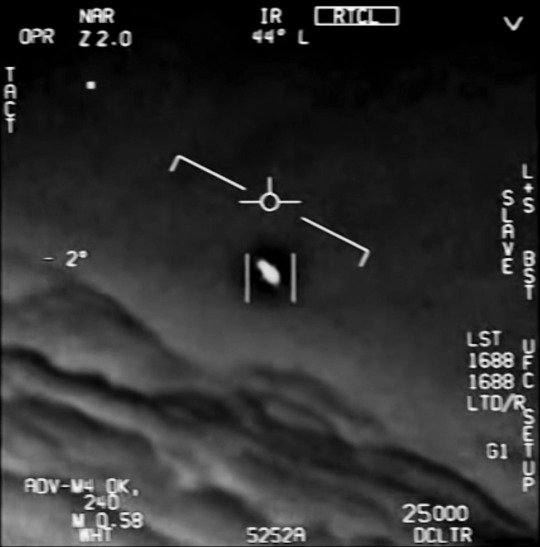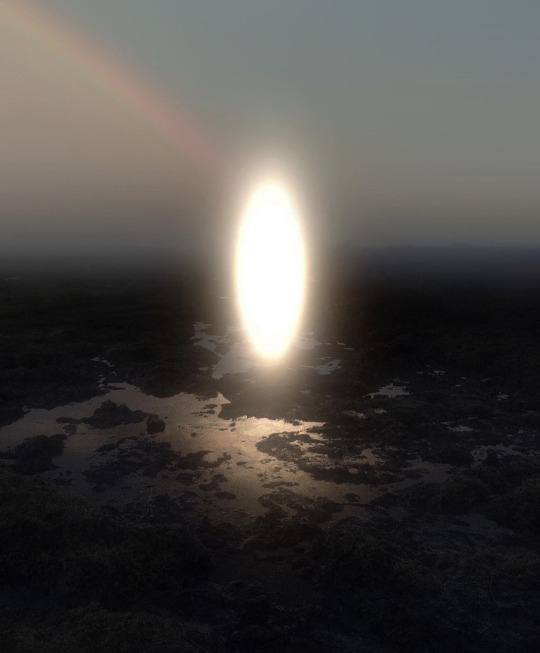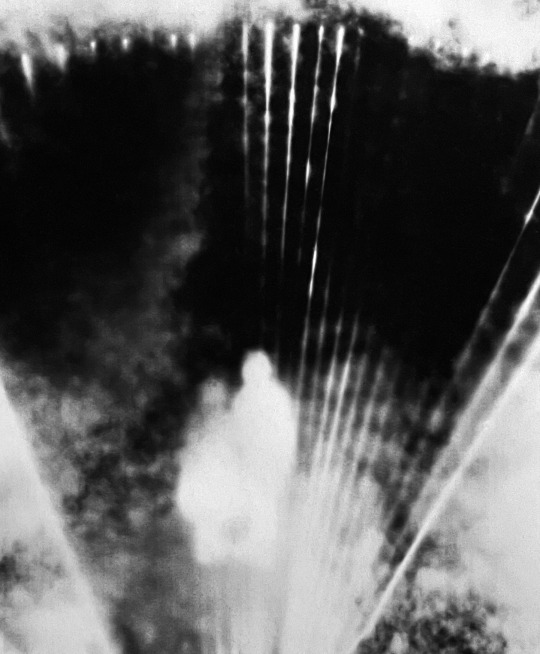Text

Photography by Julien Coquentin, The Dead Zone series. [Ref.]
4 notes
·
View notes
Text
“Stanford’s questioning was based on two considerations: (a) extrasensory response, like sensory response, presumably functions in support of the needs and/or dispositions of the organism; but (b), serving those inclinations logically need not require conscious knowledge of the information to which psi-driven action is responding. Indeed, an adaptive or disposition-affirming outcome orchestrated by implicit (that is, unconscious, automatically processed) psi or sensory information often might be the most efficient way to move the organism away from a threat or toward a gratifying situation. PMIR mechanisms support that possibility even when the respondent has no conscious awareness of it.”
Duggan, M. (2020). “Rex G Stanford”. Psi Encyclopedia. London: The Society for Psychical Research. https://psi-encyclopedia.spr.ac.uk/articles/rex-g-stanford. Retrieved 30 March 2024.
#psi#anomalous cognition#extrasensory perception#precognition#presentiment#parapsychology#psychism#indexanomalouscognition
5 notes
·
View notes
Text
Luke, David. (2007). The science of magic: A parapsychological model of psychic ability in the context of magical will. Journal for the Academic Study of Magic. 4. 90-119.
Abstract: This paper describes a parapsychological model of psychic ability in terms of its intrinsically magical undercurrent, thereby providing a bridge, hitherto largely unconnected, between science and magic. Initially proposed by Rex Stanford in the 1970’s, the model, seeks to explain the unconscious everyday use of ‘psi’ (precognition, telepathy, clairvoyance, or psychokinesis) as a means of serving the needs and desires of the organism. The model, termed ‘psi-mediated instrumental response’ (PMIR), is based on the principles and research of cognitive, behaviourist, and para- psychology from an evolutionary perspective. Yet it is shown that, by extrapolating the inferences of this model and by subtly re-orientating it to a magical perspective, it can serve as a useful psychology of magical operation. By drawing comparisons between Stanford’s model and the occult psychology of the chaos magic current, and with particular regard to the work of Austin Osman Spare, the essay highlights the parallels between these bodies of thought. While this demonstrates some synonymous mechanics for the manifestation of the magical desire it also offers a heuristic model for the functioning of magic that is compatible with mainstream cognitive science and which can be, and has been, tested empirically. Furthermore some consideration is given to scientific research’s magical nature, which has been unearthed in the process of searching for a science of magic. Despite objections from both magicians and scientists, by cross-pollinating the flowers of these two fields in this way possibilities emerge for the utilisation of empirical research to augment magical belief systems for those with a scientific leaning, whilst simultaneously illuminating new regions for growth in the formation of occult science.
#magic#magick#occultism#chaos magic#chaos magick#Austin Osman Spare#anomalous experience#anomalous cognition#anomalous perturbation#extrasensory perception#psychokinesis#parapsychology#psi#psychic development#indexanomalouscognition#indexanomalousperturbation
2 notes
·
View notes
Text
“The basic concept surrounding the PMIR [Psi Mediated Instrumental Response] was that human beings utilize psi to accomplish something (the instrumental response) that fulfills certain needs in which the individual consciously or subconsciously possesses. Such concepts lead to arguments suggesting that psi may be far more common in daily life than is immediately apparent, but that psi does accomplish its goals in a subtle elegant manner void of conscious awareness. Further arguments then direct us towards the question ‘if psi is a staple in our subconscious daily life, can psi be directed to be a staple in our conscious daily life to any extent?’”
— Theresa M. Kelly [Ref.]
#anomalous perturbation#psychokinesis#psi#parapsychology#psychic development#psychism#anomalous cognition#extrasensory perception#esp#precognition#presentiment#indexanomalouscognition#indexanomalousperturbation
3 notes
·
View notes
Text
"The term psychokinesis (PK) covers a wide spectrum of putative psi phenomena, ranging from metal bending, poltergeists, and table levitations, to distant infuence on human physiology, animal activity, or plant growth. Psychokinesis also refers to situations where statistical deviations from chance in probabilistic systems, such as tumbling dice or coin-tosses, are observed to correlate with participants’ wish or intention for a particular outcome. PK studies on probabilistic systems were carried out in various laboratories during the 1940s and 1950s, typically employing mechanical devices with tumbling dice or coin tosses. In the early 1970s hardware random number generators (RNGs) began to replace mechanical systems and quickly became widespread in parapsychology, frst as self-standing units and later in computer controlled confgurations. Compared to the earlier mechanical systems, RNGs greatly simplifed the testing process and thus attracted a wide range of researchers who began exploring a spectrum of hypotheses and variables potentially associated with PK. Effects reported in association with RNGs are generally qualifed as micro-psychokinetic, suggesting a distinction between large-scale or directly perceptible PK and extremely subtle effects that can be inferred only through statistical methods. It is unclear whether the term should apply to all probabilistic systems, even when clearly macroscopic; nor is it certain whether the distinction between macro- and micro-PK points to fundamental differences or merely operational ones."
Varvoglis, M., & Bancel, P. A. (2016). Micro-psychokinesis: Exceptional or universal? Journal of Parapsychology, 80(1), 37–44.
#psychokinesis#anomalous perturbation#parapsychology#psychic development#psi#indexanomalousperturbation
3 notes
·
View notes
Text
Altering the scenario you find yourself in once lucidity has been achieved can be incredibly difficult. I've only managed to do this a few times, mainly by either flying far away from where I began or by concentrating intently on some minuscule detail in the environment, which typically causes the entire dreamscape to go dark before morphing into my desired setting. Resetting the dreamscape can also be achieved by purposefully waking up after becoming lucid, then immediately falling back to sleep while visualizing the scenario you'd like to appear in.
However, I will say that consciously taking an active part in the scenario you started in can result in some very interesting and illuminative experiences, especially if you're able to converse with dream characters nearby. In doing so, you may find that some characters are more "sentient" than others and will engage with you in much more profound ways.
I've been looking more into lucid dreaming, but I've hit a wall. I can become lucid occasionally, but the real obstacle is the dream itself— oftentimes a scenario is already playing out, and interrupting it just doesn't feel possible. How do you stop a running dream plot to direct your own scenario? Do you just announce "Cut!!" like a director and imagine the people and scene relaxing, like they're actual actors and props for a movie, and then going up to them and telling them that they're gonna play a different scene now, with a new script and new set?
I tried changing things with willpower— it didn't work. The dream just broke down and I woke up. I tried walking away from the current scenario to find some empty space— it didn't work. Some fucking guy shot me in the face with a gun and I woke up. Do I have to act in bizarre ways just so the dream won't startle and buck me off its back? I guess I do have to at this point. What could go wrong? I already got shot by a dream construct. It can't get any worse than this.
If anyone has any advice or personal anecdotes related to this, I'd love to hear about it!
6 notes
·
View notes
Text
"In a typical presentiment experience, you might be driving down the road on a route taken a thousand times before. You approach an intersection with a signal light. Your signal is green, the cars on the cross road are all waiting patiently at their red light, but instead of doing what you usually do – speed up to get through the intersection before the light changes – for some odd reason you just don’t feel good about this intersection. So you approach it warily and slow down. Suddenly a car that was hidden by a large truck blasts through the red light at high speed. You realize to your shock that if you had not slowed down, your car would have been hit broadside at high speed, causing a major accident. This strange feeling that caused you to slow down, or change your usual behavior in some way, is how presentiment commonly manifests in the everyday world."
— Dean Radin, "Presentiment" [Ref.]
#presentiment#precognition#anomalous cognition#extrasensory perception#esp#anomalous experience#parapsychology
0 notes
Text

"However concerning the security implications of UAP are, the scientific ramifications are nothing short of world changing. Pilots, credible observers, and calibrated military instrumentation have recorded objects accelerating at rates and crossing the air–sea interface in ways not possible for anything made by humans, and several pieces of congressional legislation support these observations by defining UAP as transmedium vehicles. The stunning implication is that engineering, materials science, and physics beyond the state of the art are needed to produce and operate these objects. This knowledge could transform such fields as air and maritime transportation, energy generation, agriculture, communications, computing, manufacturing, space travel—virtually every imaginable economic sector—not to mention defense. Further study of UAP may lead to discoveries that make those of the scientific revolution in the seventeenth and eighteenth centuries look like baby steps."
— Rear Admiral Tim Gallaudet, PhD, US Navy (ret.) [Ref.]
#unidentified aerial phenomena#uap#disclosure project#extraterrestrial intelligence#indexextraterrestrialintelligence
0 notes
Text
youtube
#Jonathan Weygandt#unidentified aerial phenomena#uap#disclosure project#extraterrestrial intelligence#indexextraterrestrialintelligence
3 notes
·
View notes
Text
"Related here is the question of how the religions might react or respond to what is sometimes called 'disclosure.' There appear to be two basic positions here in the literature. One position argues that the religions—more likely, the religion of the author in question—can assimilate and integrate such disclosure. The other position argues that religions are expressions of previous eras and forms of knowledge, not this one, and so they are incapable of the radical change that would be necessary. Hence, it is concluded, the necessity of secrecy or, in some cases, gradual disclosure. Speaking such a secret out loud or all at once would spell the end of civilization. Or such is the argument."
— Jeffrey J. Kripal, PH.D [Ref.]
#disclosure#disclosure project#extraterrestrial intelligence#unidentified aerial phenomena#UAP#indexextraterrestrialintelligence
2 notes
·
View notes
Text
“Not only is the Universe stranger than we think, it is stranger than we can think."
— Werner Heisenberg
1 note
·
View note
Text
Led by Dr. Garry Nolan, Professor in the Department of Pathology at Stanford University School of Medicine and sociocultural anthropologist Dr. Peter Skafish, Sol Foundation is assembling teams of world-class academics and government experts – including former Inspector General of the Intelligence Community (IC IG) I. Charles McCullough III serving as legal counsel – to conduct research and provide policy expertise around UAP, as well as help set the agenda for the wider study of UAP.
As the revelation of the reality of UAP is likely to be world-changing in every sense of the term, Sol Foundation’s mission is to be a leading source of research on the issue, while providing the most informed and insightful policy recommendations to governments. The Foundation will encourage greater government transparency, drive collaborative sharing and review of academic insight, and champion methodical, scientifically-robust assessment and analysis.
#extraterrestrial intelligence#disclosure project#unidentified aerial phenomena#UAP#indexextraterrestrialintelligence
3 notes
·
View notes
Text
“A young woman I was treating had, at a critical moment, a dream in which she was given a golden scarab. While she was telling me this dream I sat with my back to the closed window. Suddenly I heard a noise behind me, like a gentle tapping. I turned round and saw a flying insect knocking against the window-pane from outside. I opened the window and caught the creature in the air as it flew in. It was the nearest analogy to a golden scarab that one finds in our latitudes, a scarabaeid beetle, the common rose-chafer (Cetonia aurata), which contrary to its usual habits had evidently felt an urge to get into a dark room at this particular moment. I must admit that nothing like it ever happened to me before or since, and that the dream of the patient has remained unique in my experience.”
Carl Jung, Synchronicity: An Acasual Principle, R. F. C. Hull trans. (Princeton: Princeton University Press, 1973), 22.
2 notes
·
View notes
Text
“In the culture of my people, the Dagara, we have no word for the supernatural. The closest we come to this concept is Yielbongura, ‘the thing that knowledge can't eat.’ This word suggests that the life and power of certain things depend upon their resistance to the kind of categorizing knowledge that human beings apply to everything. In Western reality, there is a clear split between the spiritual and the material, between religious life and secular life. This concept is alien to the Dagara. For us, as for many indigenous cultures, the supernatural is part of our everyday lives.”
— Malidoma Patrice Somé, Of Water and the Spirit
6 notes
·
View notes
Text
“Referring to something as 'supernatural' is not to call it unreal or untrue - on the contrary. The existence of the term itself is a linguistic and cultural acknowledgment that inexplicable things happen which we identify as being somehow beyond the natural or the ordinary, and that many of us hold beliefs which connect us to spheres that exist beyond what we might typically see, hear, taste, touch, or smell. It resonates with the idea that even though we have advanced technologically, there still are elements and concerns that rest outside our arena of control or conscious understanding.”
― Barbara Walker, Out Of The Ordinary: Folklore and the Supernatural
2 notes
·
View notes

